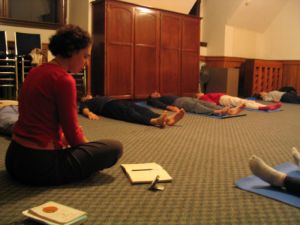Please note; After Freedom Center offering free weekly yoga classes for many years, similar services are now being organizing by the Recovery Learning Community; contact them to find out more. Thanks!

We have free weekly yoga classes in downtown Northampton!
Please email us to confirm details.
The Yoga group that was previously meeting on Monday at 7:45 has changed time and location. The Monday Yoga group will be meeting at the First Church at the Center Street Entrance. There is a ramp to the left of the building, across from the Iron Horse performance venue. Class will begin each Monday at 7:00pm, and will run until 8:15pm.
The second class meets every Thursday at 3:30 at Forbes LIbrary, on West St (route 66), Northampton.
Everyone can do yoga! Beginners and people with individual needs are always welcome, and our certified teacher always tailors the class to the people there. You can join anytime and there is no commitment, so feel free to check it out. If you have one, bring a mat, but if you don't we have several to share. You may also want to wear comfortable clothes (i.e. not tight jeans).
The class is free to everyone, but it does cost us money to run. So if you are not low-income and you can afford even a small donation, we really appreciate it, just give the donation to the teacher (donations are tax deductible).
This is an open community class and everyone is always welcome: no questions are asked, there is no registration or intake, and you can start anytime and come whenever you like.
Email info(at)freedom-center.org for info or lee(at)freedom-center.org. Download the yoga class flyer for printing and distributing.
Because of chemical sensitivities, please do not wear fragrances.
______________________________________________________
The following article appeared in Newsweek - February 24, 2003
Coping With Anxiety: Science shows that meditation, massage, yoga -- even laughter -- can change bad habits in the brain
Author: Claudia Kalb - With Anne Underwood, Karen Springen and Vanessa Juarez
There's Cipro, potassium iodide and the smallpox vaccine to ward off biological agents. But is there an antidote to anxiety? "I'm very frightened," said Julie White, as she exited Manhattan's Sonic Yoga last week. But she has a remedy: the stretching and deep breathing of yoga. The practice is so calming that after the terror upgrade, White made an upgrade of her own--from one class a day to two. Yoga, she says, "is my tranquilizer."
You may find the lotus pose hopelessly warm and fuzzy in the face of terror. But there are a host of activities, from working out to going for a massage, that can temper the anxiety. Many of these techniques have been used for decades, if not centuries; now advances in science are showing they can reduce the hormones associated with stress and even affect brain activity. The common trait among all: maintaining control and recognizing that our concerns are a natural response to the world we live in. "We're justified in having this fear," says Dr. Herbert Benson, president of the Mind/Body Medical Institute of Boston. "Life was stressful before 9-11. It's gotten progressively worse."
The first step toward combating fear is identifying it. Keep in mind that headaches, stomachaches, sleeplessness and rapid heartbeat are all symptoms of anxiety. Confront the emotion head-on by naming it, even saying, "I feel fear about this," says Saki Santorelli, executive director of the University of Massachusetts Medical School's Center for Mindfulness. Acknowledging anxiety makes us less passive, less vulnerable and, as a result, more able to cope.
Understand that fear is a component of stress, the complex fight-or-flight response ingrained in us since the cave days. When we're confronted with danger, epinephrine (adrenaline) starts pumping, the heart speeds up, blood pressure increases, breathing quickens.
One of the most efficient ways to reduce stress is to focus inward on one thing we can effectively control: our own breath. At the Mind/Body Medical Institute, participants elicit a "relaxation response," repeating a word--anything from "om" to "Hail Mary"-- silently as they exhale. In numerous studies, Benson has found that the practice leads to lower blood pressure, slower breathing and an overall calm. Richard Davidson at the University of Wisconsin-Madison recently found that a form of meditative breathing pioneered at the Center for Mindfulness can affect the brain. In a small, soon-to-be- published study, Davidson took brain images of 25 members of a biotech firm who practiced meditation six days a week for eight weeks. He found increased activation in the left side of the prefrontal part of the brain, an area associated with lower anxiety, positive emotion and inhibition of the amygdala, the brain's fear center.
If sitting in one position for more than five minutes sounds impossible, you might try yoga. Concentrating on the physical intricacies of different poses forces you to filter out the "endless tape loops of chatter and fear," says Dr. Timothy McCall, medical editor of Yoga Journal, allowing you to be present in the moment. In so doing, you begin to clear the mind of future worries.
You can also reduce angst by deliberately altering the way you perceive the world. Cognitive behavioral therapy, which focuses on identifying and changing destructive thinking, is the gold standard for treating anxiety disorders. Patients are encouraged to confront their worst fears--such as riding an elevator--to prove to themselves that they can and will survive. That experience helps get rid of distorted thinking, says Stanford University psychiatrist Dr. David Burns. What to do in the face of terrorism? Accept your anxiety, but don't let it control you. And certainly don't ruminate on your own. "Anxiety feeds on itself," says Dr. Paul Appelbaum, president of the American Psychiatric Association, so talk to family and friends. "Sharing the concern with others can be enormously helpful."
Scientists are finding that it can help to get outside your head completely. In a study of 60 schoolchildren traumatized by Hurricane Andrew, Tiffany Field, director of the University of Miami's Touch Research Institute, found that depression dropped in kids who received 30 minutes of massage twice a week for a month; kids who watched a relaxing video showed no improvement. And cortisol levels, the body's marker for stress, declined significantly in the massage group compared with controls. If massage isn't your thing, go for a vigorous walk, swim or bike ride. Exercise is not only good at keeping you fit, it reduces anxiety and depression, too.
It may be difficult, but in troubled times, researchers say, people need to take comfort from life's simplest pleasures. In a small study at the University of Rochester School of Medicine, Dr. O. J. Sahler found that bone-marrow transplant patients who listened to music reported less pain and nausea, and their transplants took less time to become functional. And, yes, laughter may be good medicine, too. Dr. Lee Berk, of the Loma Linda University School of Public Health, discovered that a group of students who watched a comic video for an hour had marked reductions in epinephrine and cortisol levels. "If fear is too great," says Berk, "send in the clowns." Now that's something we can all meditate on.

